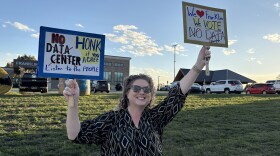Earlier this year, Louisville Tourism released a report detailing which events in 2024 were expected to have the biggest effect on the local economy.
The four biggest events have already happened, including the Run 4 Roses girls basketball tournament that wrapped up this week.
But Cleo Battle, Louisville Tourism’s CEO and president, says there’s still plenty to be excited about.
LPM News’ Jacob Munoz spoke with Battle about the second half of 2024 and his agency’s long-term plans. This conversation has been edited for clarity and length.
Mayor Craig Greenberg's administration has put together this Growing Louisville Together plan. Mentioned in that plan is providing more incentives for stuff like musical events, such as your bluegrass music program. Can you tell me about that program?
I've only been here since 2013. But what I understand is that bourbon didn't used to be very popular here at all with a lot of people. Bringing that back, we've seen a lot of success.
What we're trying to do at Louisville Tourism with LouGrass is to stimulate some growth in live music around the city. So our LouGrass program is every weekend April through October. There will be two locations where you can go and listen to bluegrass music for free.
We're just trying to seed and with the hope that this can grow in the next four or five years.
We're about halfway through the calendar year. Is this also a halfway point for the tourism year? Or is it something that's more front-loaded with stuff like Derby 150, with the PGA, with the World Education Congress?
Right now, we are probably just a hair ahead of where we were in ’23. You know, obviously, we had a fantastic May. We've got [the] NCAA Women's Volleyball Championship coming in December. We’ve still got the Danny Wimmer Presents festivals coming up in September. So there's still a lot of year to go and there's still a lot of big events that are going to be here in town.
Are there city projects or infrastructure goals that the tourism agency promotes or wants to collaborate with other entities on? Does that fall into your purview?
As I've gotten to know the mayor, over the last year or so, he wants to make sure that we find ways to help invest in tourism infrastructure. So I’ll give you an example of tourism infrastructure: Downtown Ambassadors.
The Downtown Partnership has some funding for that. I think the city provides some funding for that. And now Louisville Tourism provides some funding for that, to help with that infrastructure. And that’s good for you, when you’re down here for the weekend, with your friends. It’s good for visitors when they’re here.
I'll give you another example. We have a strong partnership with the airport. And so whenever the airport lands a direct flight—so we'll say, Boston—whenever they land a direct flight, we go into those direct flight markets, and we do advertising and marketing.
Is that the main philosophy of your advertising campaign when it comes to cities or regions?
That's one of the legs. There are numerous publications and media outlets that we market in. If you take a 250-mile radius around Louisville, we probably consider most of those feeder markets for leisure visitors. So Chicago's our number one market for leisure visitation.
We’ve got 19 million visitors that currently come to Louisville. I want to get to 25 million visitors by 2030.
How do you view competition when it comes to establishing a philosophy for tourism? Are you deeply invested in what other cities are doing and trying to come up with your own variations? Or is there a point where you have to say, “We're just doing our own thing”?
When you're going after meetings, conventions and events, you can have all the cute [brands], you can have the music of Nashville, but those meeting planners are buying facilities first. They don't care how cute your city is. “Can you accommodate my group in a way we want to be accommodated?”
From a convention perspective, I'm going to come to Louisville and I've got to put my folks in eight or nine hotels to accommodate versus if I go to Columbus or [Indianapolis], I could use three or four hotels to accommodate. We're at a competitive disadvantage.
So I think competition more so about from a meeting, convention and event perspective, is much more—we are keeping up with what they're doing, how many hotel rooms they have versus what we don't have. But from a leisure tourism perspective, we're in a really good spot.





